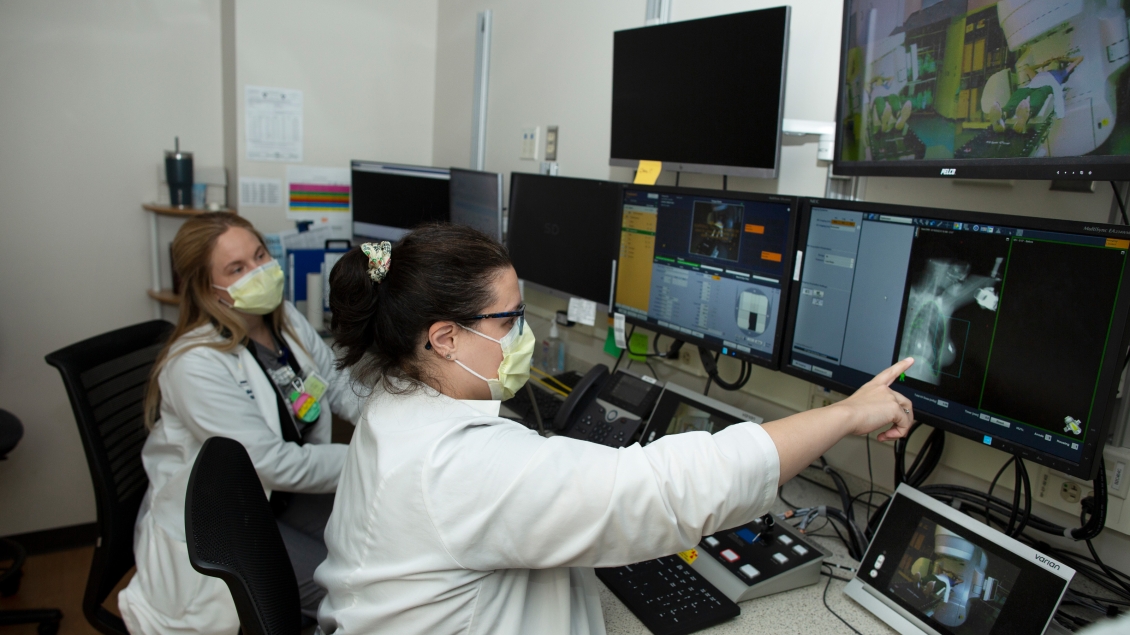
Aiming for Excellence
We believe excellence in cancer care comes from continuously working to assess and develop new therapies, while always aiming for compassionate communication and support.
The goal of the Radiation Oncology Department is to deliver the best patient care possible. We also aim to improve that "best" constantly by focusing on patients and family, by assessing new therapies in clinical trials, by developing new technologies to guide treatment planning, and by supporting basic research into understanding cancer biology.
Each individualized treatment involves a team of each faculty physicians and physicists, residents, physician's assistants, nurses, social workers, radiation therapists, medical assistants and dosimetrists who are focused on the patient and their family. We aim to make this difficult time a bit easier by striving to communicate well, to decrease wait times and by having community practices around the state.
The Rogel Cancer Center's dedicated cancer teams provide personalized treatment plans for our patients.
For more information or to make an appointment, please call Michigan Medicine at 734-936-4300 or any of our Community Clinics across the state:
- Alpena: MidMichigan Health, Alpena Cancer Center
For an appointment, call: 989-356-7353 or 1-888-356-7151 - Ann Arbor: Michigan Medicine, University Hospital
For an appointment, call: 734-936-4300 - Ann Arbor: VA Healthcare System
For an appointment, call: 734-845-3914 - Brighton: Brighton Center for Speciality Care
For an appointment, call: 734-936-4300 - Grand Rapids: Lacks Cancer Center
For an appointment, call: 616-685-6218 - Novi: Assarian Cancer Center
For an appointment, call: 248-465-4300 - Southfield: Providence Cancer Center
For an appointment, call: 248-849-3321 - Wyoming: Cancer Center at the Village, University of Michigan Health-West
For an appointment, call: 616-252-8180
The Department of Radiation Oncology is proud of its status as a leader in treating patients with cancer, a status achieved by providing cutting-edge therapies and compassionate, attentive patient care.
We believe that an important step in providing the best care is helping patients understand the services they are going to receive. As such, we created materials to help you understand and navigate your radiation therapy experience.
Radiation therapy is designed to treat tumor-containing tissue. Occasionally, normal tissue receives radiation, too. During radiation treatments, some normal tissues are temporarily irritated. This irritation usually resolves shortly after treatment. Rarely, delayed or chronic complications may occur. Please check with your physician for further information.
The number of treatments will vary between individual patients and the various diseases being treated. Some patients receive only a single treatment, others as many as 45. The doctor will review the treatment objectives and goals, and number of treatments being planned for you. Radiation treatments are generally delivered 5 days a week, Monday - Friday, for 2 to 9 weeks, depending on the tumor type and location. Each treatment (from the time you enter to the time you leave the department) takes about 30-60 minutes.
Radiation treatments provide the optimal outcome if delivered in succession. Breaks in treatment are not in the patient's best interest, unless there is a family crisis or medical reason. Discuss vacation plans with your doctor early in planning.
Reactions to radiation vary from patient to patient and are dependent upon the site of treatment. The dose to a given area or depth of tissue determine the skin's surface reaction. Tumors deeper from the surface area, like prostate or endometrial, have very little skin reaction. Tumors closer to the skin surface, like larynx or throat, have the potential for increased skin reaction.
No, patients receiving external beam radiation as outpatients do not become radioactive.
Radiation usually affects just the area to which it is given. If your head is not being irradiated, you will not lose your hair.
There is a very small risk of getting cancer from this treatment. These cancers usually take more than 10 years to develop and occur in the region that was irradiated. Unfortunately, all treatments have side effects, and we are actively researching methods of decreasing those side effects.
Please call (734) 936-4300.
Our mission to constantly improve and deliver the best possible patient care includes not only individualized cancer therapy, but also individualized support of the physical, social and emotional well-being of our patients and their families. We formed a Patient and Family Advisory Council (PFAC) comprised of clinicians, former radiation patients, family members and radiation therapy caregivers to reflect on their treatment and recommend potential ways to improve the experience. We've learned that the best way to improve the patient experience is individualized patient preparation and patient and family involvement throughout the treatment journey. To that end, we offer the following supportive services:
Child Life Specialists are trained professionals who have a background in child development. Our ultimate goal is to help patients and families cope with being in the hospital setting.
The Peer Mentoring Program is designed to help empower patients who have been diagnosed with cancer to take control of their lives and their healthcare.
To be matched with a Peer Mentor
To be matched with one of our Peer Mentors, please fill out this online Peer Mentor Matching Form(link is external). You will be asked to provide your contact information, some basic information about how your cancer diagnosis/treatment is affecting you, and what you would like most from a Peer Mentor.
All conversations with your Mentor are kept in strict confidence. Peer Mentors are volunteers at Michigan Medicine and have been trained through our Patient and Family Centered Care Program(link is external).
To become a Peer Mentor
Please complete this brief online survey(link is external) to register your interest.
To learn more about the Peer Mentoring Program
Email (link sends e-mail) our Peer Mentoring Coordinator.
The department provides several resources for Radiation Oncology patients and families including videos, websites and handouts created or endorsed by clinicians.